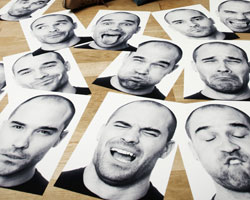Sleep, Social Cues, and Dissociative Disorders
 There’s a good chance that most of your knowledge about dissociative identity disorder (DID) — formerly known as multiple personality disorder — comes from films like Sybil (1976) or The Three Faces of Eve (1957). Sybil and Eve both develop multiple, distinct personalities in order to cope with psychologically traumatic events from their childhoods. But current research has shown that this popular “posttraumatic model” is not accurate. DID may actually arise due to a combination of factors, such as cues from therapists, a fantasy-prone personality, and even irregular sleep patterns.
There’s a good chance that most of your knowledge about dissociative identity disorder (DID) — formerly known as multiple personality disorder — comes from films like Sybil (1976) or The Three Faces of Eve (1957). Sybil and Eve both develop multiple, distinct personalities in order to cope with psychologically traumatic events from their childhoods. But current research has shown that this popular “posttraumatic model” is not accurate. DID may actually arise due to a combination of factors, such as cues from therapists, a fantasy-prone personality, and even irregular sleep patterns.
In the latest issue of Current Directions in Psychological Science, Steven Jay Lynn and coauthors write that the “sociocognitive model” is a more accurate for studying DID and other dissociative disorders. According to the newer model, traumatic events may contribute to, but not necessarily cause, DID. Instead, the authors propose that DID results from social learning and expectations based on culture, the media, and social experiences. Susceptible individuals may begin to attribute memories and personality traits to different personalities because a therapist asks them leading questions or because they have seen a television program that features a character with DID.
Another surprising factor that may contribute to dissociative disorders is sleep problems. In one study, 25 healthy volunteers who skipped one night of sleep reported more dissociative experiences. (Some dissociative experiences, such as feeling like an automaton, are pretty common.) Another study that emphasized getting better sleep in a treatment program for dissociative symptoms also showed promising results.
Could healthier sleep patterns have helped Sybil and Eve? It’s hard say because more research on sleep and DID is needed. But it couldn’t have hurt.
Lynn, S., Lilienfeld, S., Merckelbach, H., Giesbrecht, T., & van der Kloet, D. (2012). Dissociation and Dissociative Disorders: Challenging Conventional Wisdom Current Directions in Psychological Science, 21 (1), 48-53 DOI: 10.1177/0963721411429457





APS regularly opens certain online articles for discussion on our website. Effective February 2021, you must be a logged-in APS member to post comments. By posting a comment, you agree to our Community Guidelines and the display of your profile information, including your name and affiliation. Any opinions, findings, conclusions, or recommendations present in article comments are those of the writers and do not necessarily reflect the views of APS or the article’s author. For more information, please see our Community Guidelines.
Please login with your APS account to comment.